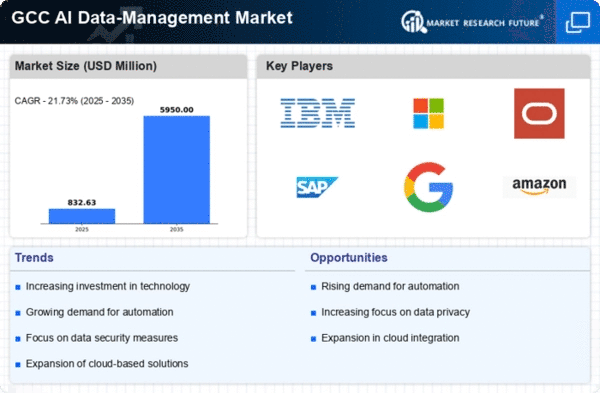Government Initiatives and Support
Government initiatives in the GCC are playing a pivotal role in shaping the ai data-management market. Various national strategies aim to promote digital transformation and innovation, thereby fostering an environment conducive to the growth of data management solutions. For instance, investments in smart city projects and digital infrastructure are expected to exceed $100 billion by 2030. Such initiatives not only enhance the technological landscape but also encourage private sector participation in the ai data-management market. The alignment of government policies with industry needs is likely to stimulate further advancements in data management technologies, creating a robust ecosystem for AI-driven solutions.
Growing Investment in AI Technologies
Investment in AI technologies is a key driver of growth in the ai data-management market within the GCC. As businesses recognize the transformative potential of AI, funding for AI-related projects is on the rise. Reports suggest that investments in AI across the region could reach $20 billion by 2025. This influx of capital is likely to accelerate the development of innovative data management solutions that leverage AI capabilities. The ai data-management market stands to benefit from this trend, as organizations seek to integrate AI into their data strategies to enhance analytics, improve data quality, and drive better business outcomes.
Rising Demand for Data-Driven Insights
The ai data-management market is experiencing a notable surge in demand for data-driven insights across various sectors in the GCC. Organizations are increasingly recognizing the value of leveraging data analytics to enhance decision-making processes. This trend is evidenced by a projected growth rate of approximately 25% in the adoption of data analytics tools within the region. As businesses strive to remain competitive, the need for efficient data management solutions becomes paramount. The ai data-management market is thus positioned to benefit from this growing emphasis on data utilization, as companies seek to harness the power of artificial intelligence to extract actionable insights from vast datasets.
Increased Focus on Operational Efficiency
Organizations in the GCC are increasingly prioritizing operational efficiency, which is significantly influencing the ai data-management market. The drive to streamline processes and reduce costs has led to a heightened interest in automation and AI technologies. Companies are investing in data management solutions that can optimize workflows and enhance productivity. Reports indicate that businesses that implement AI-driven data management systems can achieve up to a 30% reduction in operational costs. This focus on efficiency not only improves profitability but also positions organizations to respond more agilely to market changes, thereby driving demand for innovative data management solutions.
Emergence of Advanced Data Privacy Regulations
The emergence of advanced data privacy regulations in the GCC is reshaping the ai data-management market. As governments implement stricter data protection laws, organizations are compelled to adopt robust data management practices to ensure compliance. This regulatory landscape is fostering a demand for AI-driven solutions that can facilitate data governance and security. The ai data-management market is likely to see a rise in the development of tools designed to help businesses navigate these complexities. Companies that proactively address compliance requirements may gain a competitive edge, as they can assure clients of their commitment to data privacy and security.
















